Pope Francis’ six-day swing through Mexico culminated today in Ciudad Juarez, where the pontiff presided over an emotional Mass at the U.S. border. Here is how the pontiff spent his last day in Mexico:
- A visit to a penitentiary
- A meeting with “the world of labor” at a local college
- A Mass at the Juarez fairgrounds
- A farewell ceremony at the airport
Follow the Los Angeles Times’ live coverage of the trip.
- Share via
Adios, Papa Francisco
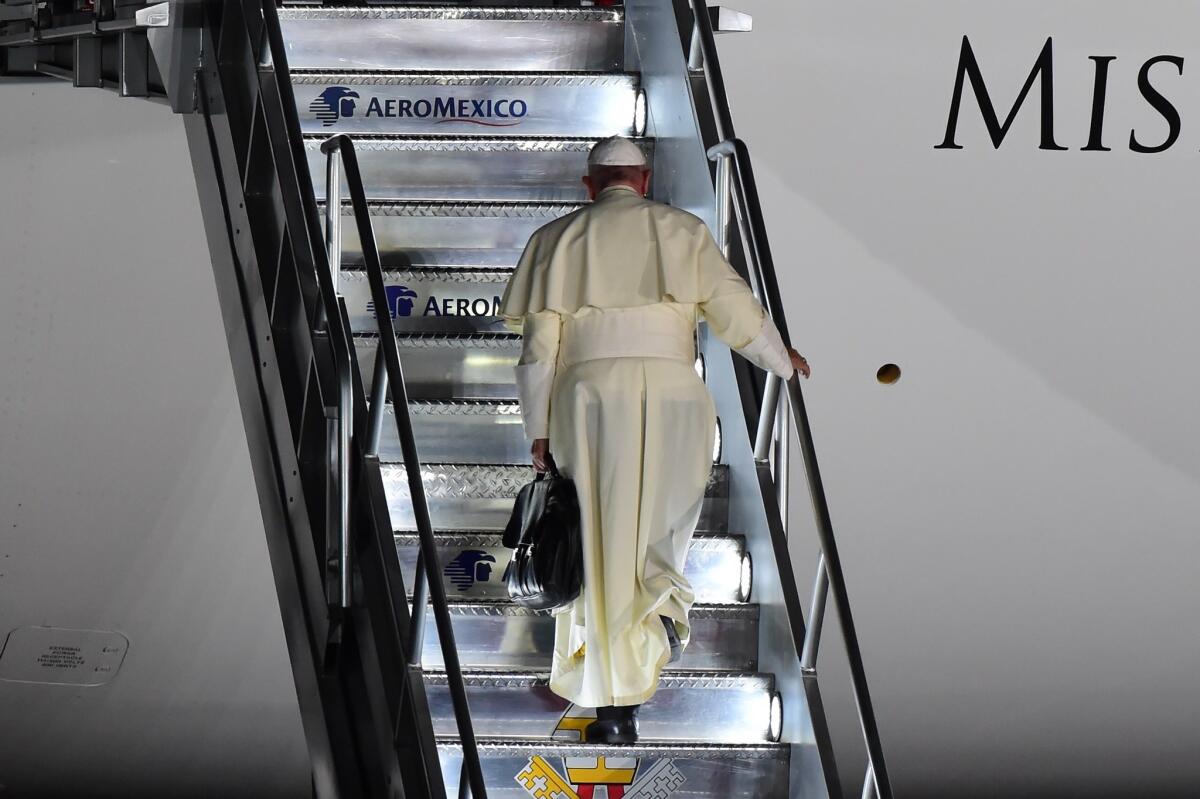
- Share via
A farewell party fit for a pope

Dancers perform for Pope Francis at the airport in Ciudad Juarez, Mexico.
- Share via
Forget the miter - give the pope a sombrero!
It appears that no papal journey to Mexico is complete without someone handing the leader of the 1.2-billion-member Roman Catholic Church a sombrero. Popes John Paul II and Benedict XVI donned them during their visits. Now it’s Pope Francis’ turn. By our count, he’s worn at least three during his trip.
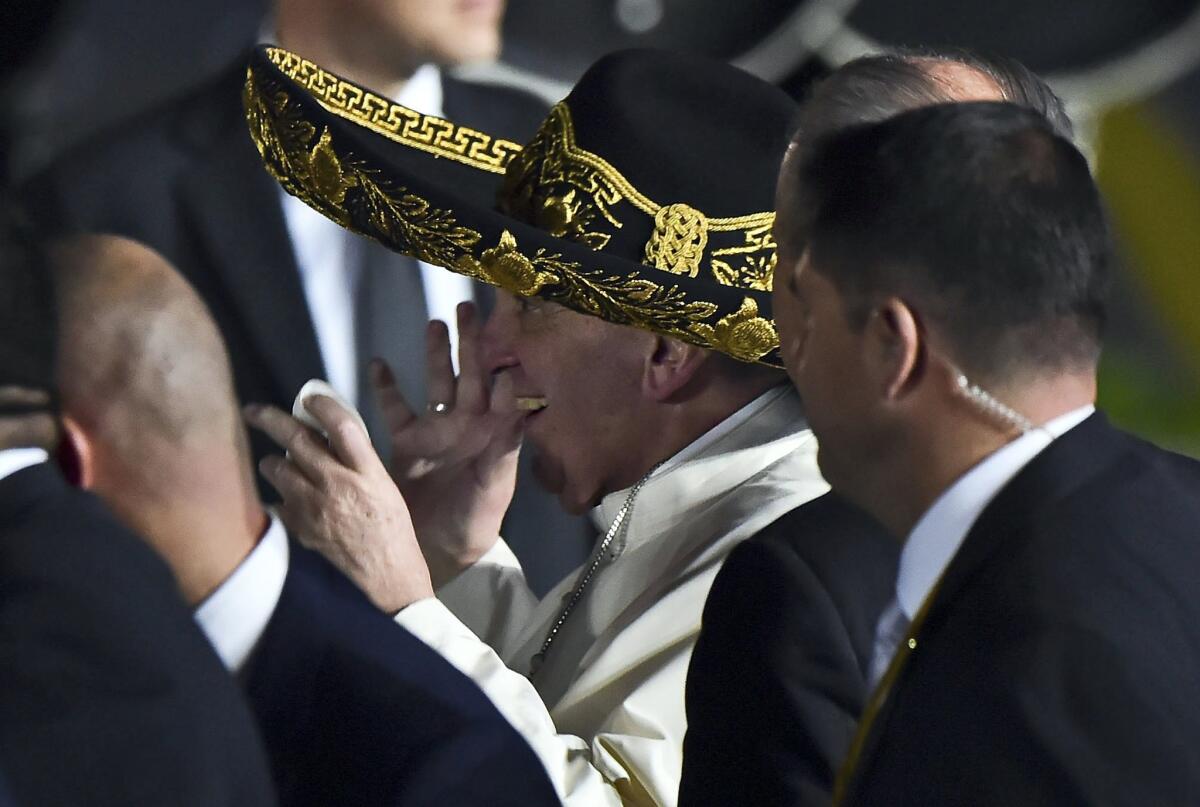
— Steve Padilla
- Share via
Thousands line streets to bid farewell to Pope Francis
- Share via
Tribute to a son lost to narco violence
Sara Hernandez came to the papal Mass clutching half a dozen yellow balloons. As she got closer to the Juarez fairgrounds, the homemaker bought a dozen papal key chains to keep the bunch from floating away.
Her 8-year-old grandson, Kevin, had inscribed one of the balloons with an important message -- not for the pope, but rather for his dead father.
“I wish that you were here with us dad,” he wrote, misspelling “wish” in Spanish.
Kevin’s mother works in the Juarez maquiladoras. His dad, Pelon Hernandez, cleaned houses in El Paso. Five years ago, he was shot and killed in front of a Juarez supermarket. His mother said he was killed by drug traffickers. Police have yet to find his killer.
So she came to see the pope wearing a T-shirt bearing her son’s name, photo and a message: “I will always remember you.”
Hernandez released the balloons at the end of the Mass -- all but one, which she tied to a barricade. Passers-by stopped to hug her and hear her story. She knows many others who have lost sons here.
“I hope it helps end the violence,” Hernandez said of the pope’s visit, her eyes tearing up. “Because of the violence, I suffer. All of us mothers; the pain never ends.”
- Share via
Cardinal Roger Mahony gives communion to pilgrims on U.S. side of the border
- Share via
Pope Francis: Thanks to technology, ‘no border can prevent us from sharing’
The pope saluted “our brothers and sisters” in El Paso, who were following a live broadcast of the Mass at the Sun Bowl stadium, adding that thanks to technology, “we can pray, sing and celebrate together ... and that no border can prevent us from sharing.”
Gracias a la ayuda de la tecnologia, podemos orar, cantar y celebrar juntos ese amor misericordioso que el Senor nos da, y el que ninguna frontera podrá impedirnos de compartir.
— El Papa Francisco
- Share via
Joy, then sadness among pilgrims who can’t cross into Mexico
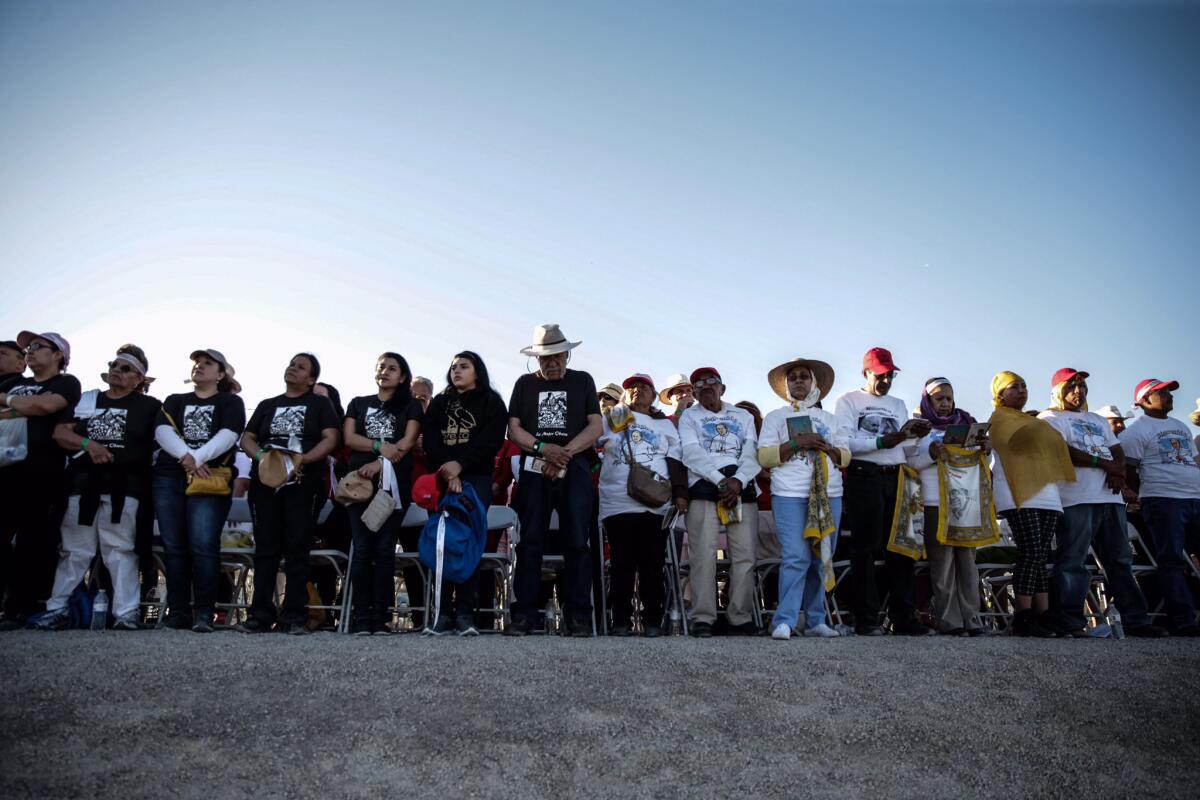
Some of those gathered on the levee on the U.S. side of the border were overcome with emotion when Pope Francis waved to them and blessed them.
“It really was beautiful,” Claudia Diaz said, crying.
But joy turned to sadness when the pontiff got back in his popemobile and headed toward the Juarez fairgrounds. Most sat quietly but couldn’t hear much of the Mass from their vantage point.
“This is so unjust, being here on this side and not to be able to cross and be over there with him,” said Diaz, gesturing toward Mexico. “We just have to be content with being on this side.”
Diaz, who is from Juarez and does not have legal status in the U.S., said many of her cousins, friends and her mother-in-law attended the Mass in Mexico.
“It’s sad here on our side because we can’t even hear the Mass,” she said. “They couldn’t even put a speaker here so we could hear it.”
- Share via
Pope decries ‘human tragedy’ that forces people to migrate, risking death
Pope Francis did not cross into the United States but stayed in the scruffy city of Ciudad Juarez, once infamous for a sky-high murder rate, especially of young women. But his message was clearly intended for both sides.
He decried the global “human tragedy” that forces people to migrate unwillingly, risking death -- “each step, a journey laden with grave injustices: the enslaved, the imprisoned and extorted.”
Reserving special mention for women “unjustly robbed of their lives,” Francis said migrants “are the brothers and sisters of those expelled by poverty and violence, by drug trafficking and criminal organizations.”
“Injustice is radicalized in the young,” the first pontiff from the Americas continued. “They are ‘cannon fodder,’ persecuted and threatened when they try to flee the spiral of violence and the hell of drugs.”
- Share via
A view of the human chain formed for the pope
An estimated 70,000 people formed a human chain to protect the papal motorcade along the 25-mile route from the airport to the border.
- Share via
Pope Francis waves across the Rio Grande to people in the U.S.
- Share via
Following in footsteps of migrants, pope says a blessing at U.S.-Mexico border
At the start of the border Mass, Pope Francis mounted a ramp where one large cross and several smaller ones were posed to represent migrants killed in their attempts to reach the U.S. He said a blessing, with Texas on the nearby horizon. Those gathered on the levee waved and shouted, “te queremos, papa” -- “We love you, pope.”
- Share via
Crowds waiting at U.S.-Mexico border erupt in cheers for Pope Francis
The waiting crowds erupted in cheers as the popemobile entered the Ciudad Juarez fairgrounds. Elderly men, overcome with emotion, wept.
- Share via
For one migrant, ‘What the pope is doing is a miracle’
Claudia Diaz, a 44-year-old woman who lives in New Mexico, where she does not have legal status, walked onto a levee on the U.S. side of the border, past Border Patrol agents and a highly fortified fence.
She said she wasn’t scared and instead focused on finding her seat in a VIP section -- the closest spot to the pope on this side of the border.
“This right here, what the pope is doing, is a miracle because he has permitted for people like us to be at this place -- in these lands that are so vigilados, so militarized, where so many have died trying to cross this river,” she said, pointing to the mostly parched Rio Grande. “For us to be here at this moment is very big.”
- Share via
Crowds stream into Juarez fairgrounds for pope’s Mass
People are streaming into the old fairgrounds in Ciudad Juarez for the pope’s open-air Mass.
Ticket holders are given color-coded wristbands, and volunteers steer them into barricaded areas, some at the foot of massive screens broadcasting musical performances and imagex of the pontiff’s progress through town.
“Are we ready for the pope? Raise your hands!” an announcer called. Hundreds of hands went up, then applauded.
In a section near the back of the gravelly field, Jorge Balderrama claimed a spot with three relatives, laying blankets on a section of blacktop hours before the Mass was due to start. There was no shade, no way to avoid the intense sun as the day went on, but the sales manager didn’t mind.
“We came to get his blessing,” said Balderrama, 45. “It’s a way to give us hope, having him with us.”
Though he said he doesn’t expect the Mass to bring an end to the violence in his native Chihuahua state, in the long run, “this will change a lot of people’s consciences.”
- Share via
A pilgrimage to the border to receive a papal blessing
About 400 people, including local officials, religious leaders, migrants and activists, were bused from El Paso to a levee near the Mexican border to receive a blessing from Pope Francis.
- Share via
A pilgrim on the pope’s visit to Mexico: ‘He’s trying to change things for us’
Martina Miguel Martinez, 40, brought her 5-year-old son, Angel Gabriel Anaya Miguel, to see the pope.
She moved to Ciudad Juarez from Oaxaca years ago to work in the maquiladora industries that supply the U.S. with clothing, television sets, snacks and other consumer products.
She returned to Oaxaca in 2008 to aid her ailing mother, and stayed away once she had her son as the violence escalated. The two returned in August, and she went back to work.
“It seems safer. I see news and hear stories about assaults, but no one has touched me,” she said.
She’s Catholic, and has noticed the attention Pope Francis pays to immigrants.
“I think he’s trying to understand, because he doesn’t live it,” she said as she walked her son along the long line to enter Mass. “He’s trying to change things for us.”
- Share via
A nation away, El Paso shuts down for pope’s visit
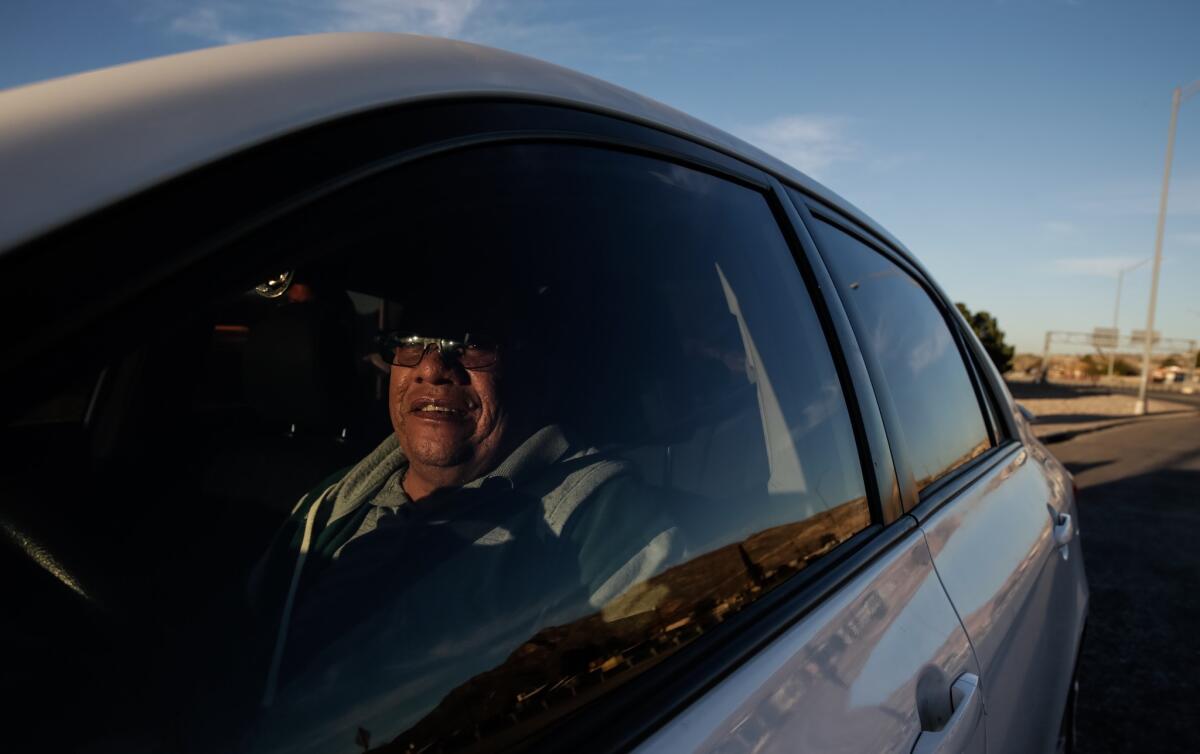
Raul Gallegos, an Uber driver, was about the only vehicle in downtown El Paso early Wednesday morning.
He said he’d never seen the city so quiet on a weekday. “Usually there is a lot of traffic on the street,” he said.
All the extra security, especially the multiple blockades, seemed a bit much, he said.
“It would have been different if he would’ve come here,” he said of Pope Francis.
Still, he said, even though the papal visit is a nation away, it may be worth all the inconvenience and the money the city has spent on security for the visit.
“I think it’s great for the community,” he said. “It’s especially good for Juarez. They’ve had a hard time with all the violence.”
A cross dangled from his rear view mirror as he made his way to the border.
- Share via
Spotted in El Paso: Cardinal Roger Mahony
- Share via
Pope Francis: ‘What kind of Mexico do you want to leave your children?’
In a city famed for low-wage assembly jobs, Pope Francis asked a group of workers and employers:
What kind of Mexico do you want to leave your children? Do you want to leave them the memory of exploitation, of insufficient pay, of workplace harassment? Or do you want to leave them a culture which recalls dignified work, a proper roof and land to be worked?
— Pope Francis
¿Qué quiere dejar México a sus hijos? ¿Quiere dejarles una memoria de explotación, de salarios insuficientes, de acoso laboral? ¿O quiere dejarles la cultura de la memoria de trabajo digno, del techo decoroso y de la tierra para trabajar?
— El Papa Francisco
- Share via
Water and prayer cards for the pilgrims
Catholic volunteers are handing out water and prayer cards to joyous pilgrims making their way from El Paso to Ciudad Juarez, Mexico -- some with the image of Pope Francis emblazoned on their shirts.
Usually there would be a long line of autos stretching toward the bridge. Not Wednesday. Although the bridge was open to foot and car traffic in the morning, It was mostly pedestrians and there were fewer than expected.
“I think everyone is over there already,” said Maribel Herrera, 45, of El Paso.
She and four other friends won a raffle and scored tickets to attend the Mass in Juarez.
“This is a once-in-a-lifetime opportunity,” said Victoria Terriquez, 29 of El Paso.
- Share via
Five silver roses for Pope Francis
- Share via
‘The only ones who protect us are the cartel of Juarez,” altar boy says
Three altar boys waited to enter the papal mass in their red-and-white outfits and silver crosses. They came with a church group from Cuauhtemoc, in Mexico’s Chihuahua state, where they grew up distrusting police.
“The only ones who protect us are the cartel of Juarez, the narcos. They defend us,” said Isai Solano, 14, while eating fried beans and salsa he had bought in a plastic bag.
He especially distrusts the federal police who, despite all the public rhetoric about things becoming safer, he said still act with impunity.
“The federales kill people and leave them and nothing happens,” he said as several local Juarez police stood nearby.
His hope for the future?
“I hope the police change,” he said, because for now, “the people of El Chapo are the police.”
- Share via
Long lines forming to get into pope’s Mass
- Share via
Pope Francis blasts culture that incarcerates those trapped ‘in a cycle of violence’
Pope Francis visited a notorious prison in Ciudad Juarez on Wednesday, saying he could not ignore the most marginalized of Mexican society and blasting a culture that incarcerates those trapped “in a cycle of violence and crime.”
“We have already lost many decades thinking and believing that everything will be resolved by isolating, separating, incarcerating and ridding ourselves of problems, believing that these policies really solve problems,” the pope said.
Ya tenemos varias décadas perdidas pensando y creyendo que todo se resuelve aislando, apartando, encarcelando, sacándonos los problemas de encima, creyendo que estas medidas solucionan verdaderamente los problemas.
— El Papa Francisco
Prisoners filed in a line to greet the pope individually, as a band played “Besame Mucho” (“Kiss me a lot”).
The inmates had spiffed up the facility ahead of the pope’s arrival, painting and removing trash. Male and female prisoners wore identical uniforms emblazoned with the name of the prison.
“From inside this prison,” the pope continued, “work hard to change the situations which create the most exclusion. Speak with your loved ones, tell them of your experiences, help them to put an end to this cycle of violence and exclusion.”
Luchen desde acá dentro por revertir las situaciones que generan más exclusión. Hablen con los suyos, cuenten su experiencia, ayuden a frenar el círculo de la violencia y la exclusión.
— El Papa Francisco
- Share via
Variations on the popemobile
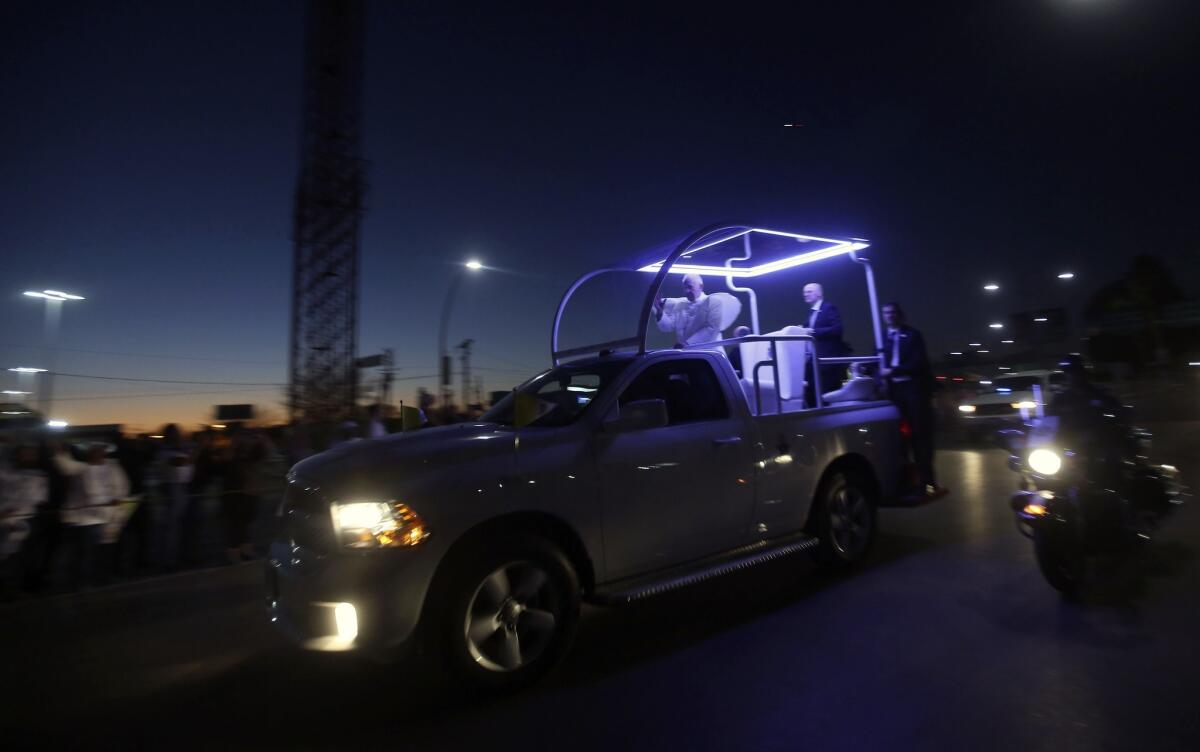
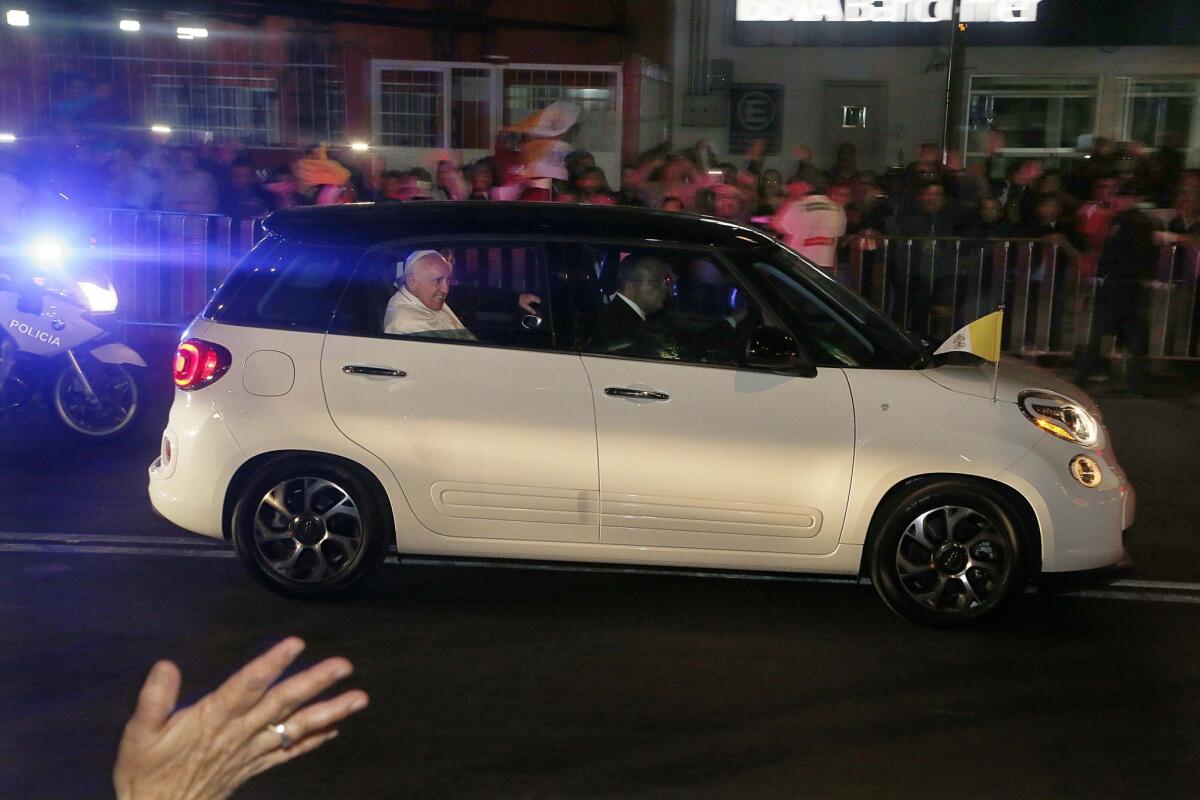
- Share via
Pope lands in Ciudad Juarez and is presented with keys to the city
- Share via
Memorials to murdered women in Ciudad Juarez
Not long ago, Ciudad Juarez was known as the murder capital of Mexico.
It was also infamous for murders that singled out women, usually workers at the thriving maquiladora industries that supply the U.S. with clothing, television sets, snacks and other consumer products.
Pink crosses have been erected on the spots where women’s bodies were found.
Much of the killing has subsided, after deals were struck with drug gangs. But kidnappings and extortion remain rampant.
- Share via
Will Pope Francis meet with families of ‘los 43’?
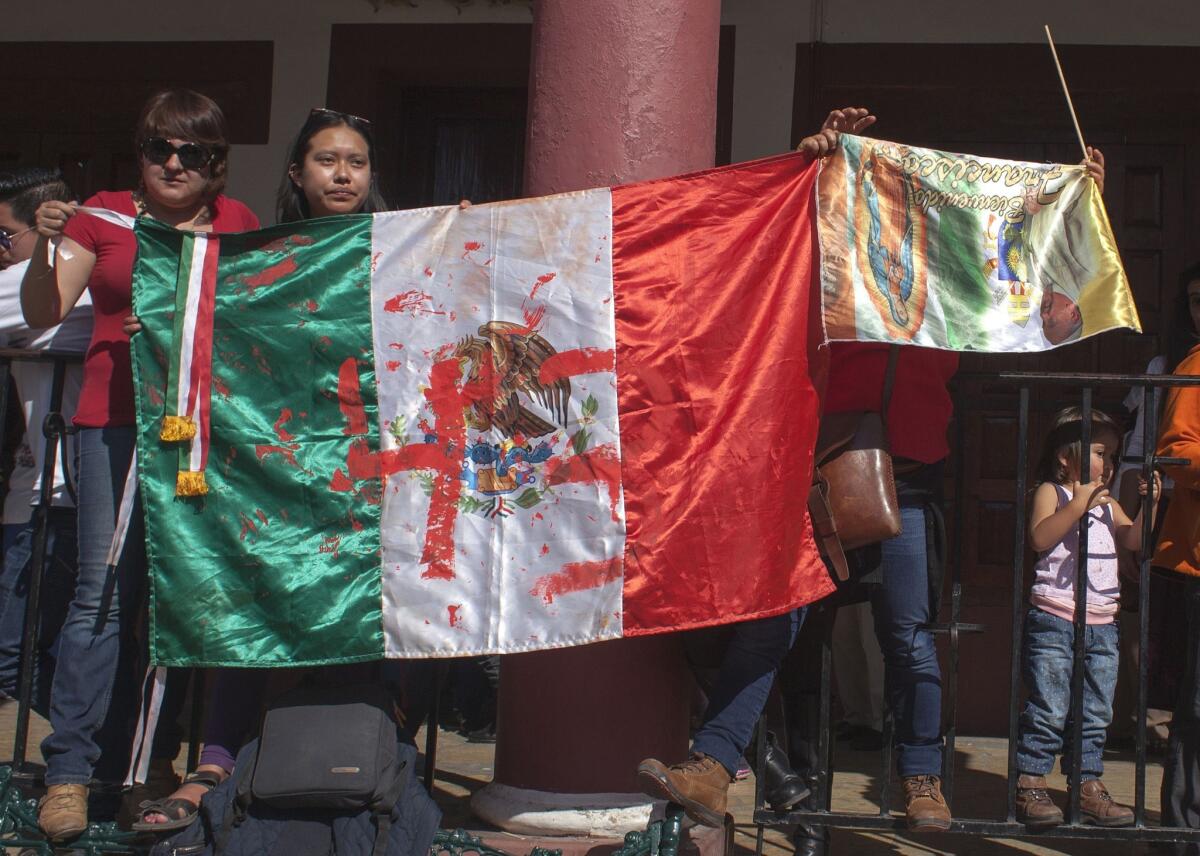
A running question during Pope Francis’ trip has been whether the pontiff will meet privately with victims of violence, including the families of 43 college students kidnapped and presumably killed by corrupt authorities.
The massacre of “los 43” has been a steady cause of outrage in Mexico.
The students’ parents were offered seats at Wednesday’s Mass in Ciudad Juarez and hope to deliver a document to Francis with information about their case, even if they don’t get to meet with him in person.
For Meliton Ortega Carlos, whose son Mauricio is among those students, it’s about more than his son or his son’s classmates. The case is symbolic of the larger epidemic of the missing.
When he saw the thousands who joined him to march in Mexico City in remembrance one year afterward, he knew that the meaning of the case had not diminished.
“We believe that the objective of the government is that we’ll forget the case once enough time passes,” he said. “We say, ‘Until there is justice we will continue fighting.’ ”
— Laura TillmanRead More
- Share via
Many in El Paso plan to cross into Juarez for pope’s visit
Pilgrims are already trickling into Ciudad Juarez from El Paso for the pope’s afternoon Mass. Many in the U.S. border city were planning to cross into Mexico for the ceremony -- some for the first time in a decade.
Of the 215,000 tickets distributed for Mass, at least 10,000 went to El Paso. An additional 4,000 people were expected to cross from the U.S. to join a human chain protecting the pope’s 25-mile route from the airport to the border Mass.
“The truth is, we’re united in many ways across our border,” said El Paso Bishop Mark Seitz. “A high percentage of people in El Paso have relatives in Juarez or send their children to school there or work there. Our geography, our history unites us.”
But some in El Paso were still hesitant to cross, even for the pope.
“Imagine: All the criminals are going to be out,” Rosemary Rivera, 45, said recently as she sat with friends at a park in El Paso’s El Barrio neighborhood, where many Mexican families moved to flee gang and cartel violence.
- Share via
Residents hope the pontiff will see Juarez as a work in progress
Not long ago, Ciudad Juarez was known as the murder capital of Mexico.
Hundreds of young women disappeared in the 1990s, falling victim to brutal robberies and murderous sexual assaults. Then battling drug cartels unleashed a worse wave of violence. Nearly 11,000 people were killed in the the sprawling border city from 2007 to 2013.
These days, however, billboards proclaim, “Juarez es amor” — Juarez is love — and officials are claiming a more than 40% drop in homicides over the last two years.
Residents say they hope Pope Francis and an expected 450,000 visitors Wednesday see their city as a work in progress, safer but still struggling with crime and poverty.
Victor Nunez, 36, was among the construction crews that worked night and day to raise an open-air altar near the border where Francis will celebrate Mass for tens of thousands, the culmination of his six-day tour to Mexico.
“This will get rid of the notion that this is a city of violence,” he said.
- Share via
A human chain to protect the pope
Some 70,000 volunteers will be forming a human chain to protect Pope Francis along his 25-mile route from the airport in Ciudad Juarez to the site of an outdoor Mass near the border. They include about 4,000 people who crossed from the U.S.
- Share via
Next up for the pope: Ciudad Juarez and a cross-border Mass
- Share via
A surprise for Iris and Luis
Iris Alondra Hipolito, a 17-year-old high school student from Los Angeles, didn’t know what was coming.
She and her 14-year-old brother Luis traveled to El Paso on Tuesday as part of a group of Catholics and immigration advocates from Southern California who came to see Pope Francis — and to call for the reform of U.S. immigration laws.
The pope will visit Ciudad Juarez, El Paso’s Mexican sister city, on Wednesday. Iris and Luis thought they were simply going to the Juarez airport to greet other Catholics who would join their group. Then there she was — their mother.
The teenagers are U.S. citizens. Their mother, Maria de Lourdes Molina Garcia, once lived in the U.S. without legal status and now lives in a small village in the state of Oaxaca. She hadn’t seen them in more than two years. Molina knew her children would be there, but the group’s organizers kept it a secret from Iris and Luis.
“Mom, I didn’t know,” Iris kept saying, her eyes filling with tears.
- Share via
Pope Francis appears to lose his cool in Morelia
In an uncharacteristic moment, Pope Francis appeared to lose his cool Tuesday with some overly eager members of the crowd in Morelia.
Video footage shows the pope getting tugged and jostled when he went to greet the faithful at a barrier. At one point, it looks like he is about to fall down.
The visibly irritated pope is seen waving his hand and apparently chastising someone in the crowd.
“That’s something you don’t do,” he said, according to the Associated Press.
- Share via
An unusual offering for a pope

Father Javier Calvillo Salazar arrived at the border crossing in Ciudad Juarez with an unusual offering for Pope Francis: a box full of immigrants’ old shoes, worn and dirty.
Father Javier Calvillo Salazar arrived at the site of Pope Francis’ upcoming appearance carrying an unusual offering: a box full of migrants’ old shoes, worn and dirty.
“This is a monument dedicated to immigrants,” Calvillo said after removing his own sandals to ascend onto a cement platform and arrange more than half a dozen pairs of shoes at the base of an enormous cross facing the bridges that span the Rio Grande.
Among them: a man’s dust-covered black and red slip-ons, the pink and white sneakers of a woman and a child-size red and blue pair.
“The Holy Father has said that he is coming to see this to console the people,” the priest said after descending the platform where the pope is expected to deliver a blessing before Mass on Wednesday. “What could be better than when he comes up here and sees lots of symbols, lots of signs of those who most need this love and care?”
Calvillo runs the local diocese’s Casa del Migrante, a refuge for deportees from the United States, and migrants from the interior of Mexico, and from Central America.
Beside the shoes, Calvillo and those who have worked on the monument placed three 3-foot-tall replicas of the 33- by 10-foot cross.
These will be blessed by the pope and given to the three local dioceses, he said: Juarez, Mexico; Las Cruces, New Mexico; and El Paso, Texas.
- Share via
Mexican youth tell the pope about their troubles: ‘We want to live in peace’
Thousands of young people packed into a soccer stadium in Morelia to meet with Pope Francis, waving yellow, blue, red, green and orange flags -- and their cellphones -- in the air and jumping up and down.
“¡Esta es la juventud del papa!” they chanted. “This is the youth of the pope!”
A child carrying a flag from a diocese in each state of Mexico traced the field. Kids released white balloons.
The pope waved two girls onto the stage. Both sprinted up the stairs, buried their faces into his chest and sobbed. The pope kissed their foreheads over and over.
Four young people from different regions of Mexico told the pope of their struggles -- violence, few good jobs, disillusionment. The pope nodded and took notes.
Other children in the stadium did the wave.
“Queremos vivir en paz,” a teenager from the diocese in Morelia told the pope. “We want to live in peace.”
- Share via
The stadium erupts in cheers for Pope Francis
- Share via
A papal hug for two girls in Morelia
- Share via
Mexican youth are ready to meet with the pope
- Share via
Some clergy seem to be trying to soften pope’s message to Mexican church hierarchy
Confronted with the expansion of organized crime groups in Mexico, Catholic Church leaders have faced tough choices, and more than a few have given in to traffickers, either cowed or complicit in taking tainted money.
Pope Francis made his feelings clear before arriving Tuesday in the violent state of Michoacan, most specifically on Saturday during a speech in front of top church bishops, in which he called on clergy to act courageously against an “insidious threat.”
The pope’s challenge — an upbraiding of an institution rarely criticized — was hailed for recognizing the widespread perception in Mexico that the church often has failed to protect society and its own priests from drug violence.
But some clergy seemed to soften what was widely perceived as a tough speech, though they emphasized their commitment to heed the pontiff’s message.
“It wasn’t a scolding, in no way,” Carlos Aguiar Retes, the archbishop of Tlalnepantla, a suburb of Mexico City, said in an interview with the Mexican newspaper El Universal. “It’s profound motivation, a beautiful thought. … It fills our hearts with great desire to work.”
The mixed reactions of some clerics, some experts said, suggest they remain tone-deaf to the church’s aloof and uncaring image. The pope’s message was loud and clear, they said, and should not be ignored.
“I don’t think anyone has dared to criticize the Catholic Church so vocally and so openly in recent times,” said David Shirk, director of the Justice in Mexico Project at the University of San Diego. “And arguably it could have only come from the pope himself.”
- Share via
The excited crowd outside the cathedral in Morelia
- Share via
A California pilgrim’s quest to make peace with the church
For Juan Calderon, who was born in Michoacan but raised in Costa Mesa, the pope’s visit felt like a time for reconciliation.
“I’m soul searching,” Calderon said. “I want to make peace with the Catholic Church.”
Calderon said he was abused by a priest in a confessional in Costa Mesa when he was 14 and became disillusioned with the church.
He did, however, have a powerful moment with Pope John Paul II in 1998. Calderon was on vacation and visited the Vatican on a day the pope happened to wander into the crowd. The pontiff reached out to grasp his hand.
“That stuff they say in the Bible about talking in tongues and all that,” Calderon said, “well, in that moment, I understood.”
He remembers that feeling of tranquility and wants to get it back. So he decided to travel to his home state in Mexico to see Pope Francis.
A self-described “returning Catholic,” Calderon said he loves Francis’ focus on the environment and his openness, especially to the gay community.
For the first time in his life, Calderon said, he has started to notice some of his gay friends attending Mass.
- Share via
An array of T-shirts for the pope’s visit
The crowds awaiting Pope Francis in Morelia on Tuesday came prepared with an impressive array of pontiff-themed attire — sombreros, baseball caps, purses, satchels, bracelets, sunglasses.
The most popular item? T-shirts. Here are a few of the tees — some specifically for volunteers, others homemade. And a few that — according to the men selling them — are holy.
- Share via
An unwelcome reminder of the ties between Mexico’s political elites and drug traffickers
It didn’t take long for the pope’s visit to Michoacan to generate unwelcome reminders of the state’s notorious reputation for cozy links between political elites and drug traffickers.
Shortly after the pope’s Mass at a stadium this morning, local media reported that the son of a former governor with alleged ties to organized crime attended the service.
A photo showed a bearded Rodrigo Vallejo entering the stadium in a black overcoat and slacks, accompanied by a woman.
“Rodrigo Vallejo Reappears,” read one headline.
Vallejo stirred controversy in 2014 when a video surfaced showing him drinking beer with Servando Gomez, nicknamed La Tuta, the former leader of the Knights Templar drug cartel.
Vallejo, who claimed he had been kidnapped, was imprisoned on obstruction charges for several months before being released on bail. He is the son of Fausto Vallejo, the former governor of Michoacan who resigned his post in 2014.
- Share via
Pope Francis: ‘What temptation can come to us from places often dominated by violence?’
In his homily, Pope Francis returned to a common theme since his arrival in Mexico:
What temptation can come to us from places often dominated by violence, corruption, drug trafficking, disregard for human dignity and indifference in the face of suffering and vulnerability? What temptation might we suffer over and over again when faced with this reality, which seems to have a permanent system?
— Pope Francis
¿Qué tentación nos puede venir de ambientes muchas veces dominados por la violencia, la corrupción, el tráfico de drogas, el desprecio por la dignidad de la persona, la indiferencia ante el sufrimiento y la precariedad? ¿Qué tentación podemos tener una y otra vez frente a esta realidad que parece haberse convertido en un sistema inamovible?
— El Papa Francisco
- Share via
Thousands of troops are providing security for the pope in Michoacan
Thousands of state, federal and military forces are providing some of the tightest security on the pope’s one-day trip to Michoacan, a region that has reached states of near-anarchy from years of drug cartel domination and government corruption.
- Share via
This is how to celebrate Mass!
- Share via
The pope’s new wheels
- Share via
Pope Francis addresses drug violence

In his homily, Pope Francis urged Mexicans not to give up in the face of drug violence:
Faced with this reality, the devil can overcome us with one of his favorite weapons: resignation. A resignation which paralyzes us and prevents us not only from walking, but also from making the journey...
— Pope Francis
- Share via
Mass is underway in Morelia
- Share via
An appeal to the pope to address Mexico’s drug traffickers
Luz Adriana Lujan, 29, thinks Michoacan’s oppressive narco violence played a big role in the pope’s decision to visit the Mexican state.
“Michoacan has a strong history of narco violence,” she said. “It needs a lot of love.”
Lujan, who traveled from Tijuana to attend Tuesday’s youth event, said the pontiff has already dealt a strong blow to Mexico’s politicians during his trip. In Michoacan, she said, she hopes he speaks directly to drug traffickers.
“That way these bad people -- people who like to think that they are God -- will hear the message: Only God can take away life,” she said. “The pope will wake these people up.”
A lot of Catholic leaders shy away from the issue, she said. “I think it’s for security reasons.”
Although she’s never witnessed it in her diocese, Lujan said she doesn’t doubt there’s some level of collusion between the church and drug traffickers.
“It’s terrible,” she said. “But the devil is everywhere, and I think leaders of the faith are more vulnerable, because the devil targets them. So, of course, some will fall.”
- Share via
Memories of Mexico’s drug war: ‘What I saw was ugly, so, so ugly’

When Pope Francis visits the cathedral in Morelia on Tuesday, he will step into a plaza that holds the memory of one of the drug war’s most notorious acts of violence.
On Sept. 15, 2008, the eve of Mexican Independence Day, throngs of revelers had crowded the plaza in the state capital, Morelia, when two grenades exploded, killing eight people, wounding hundreds and introducing an indiscriminate style of narco-terrorism that plagues the country to this day.
Gerardo Padilla, who worked at the time at Hotel Los Juaninos, which overlooks the plaza, heard a series of booms. Must be more fireworks, he figured.
Then he heard shrill screams. A woman sobbing.
Padilla, 33, ran outside to look. He gasped.
“What I saw was ugly, so, so ugly,” Padilla said, wincing at the memory.
He can still see the images in his mind: People bleeding onto the stone plaza, a woman collapsing from shock, debris everywhere.
An oppressive bleakness settled across the state. “Such a sadness, such a fear to leave the house,” he said. “It lasted for months.”
At the site of the attack, there’s a small plaque honoring the victims.
“Because the spirit of love and justice always prevails over hate and violence in the heart of people from Michoacan,” it reads.
- Share via
‘A pope in Michoacan? This is history!’
People have been staking out spots near the cathedral in central Morelia since Monday evening. They unfurled blankets, cordoned off areas with rope and taped “RESERVED!” signs to the sidewalk.
Children slept on chairs, yoga mats, cardboard. A group of women did jumping jacks and Zumba to stay warm. Others in the crowd sang songs through the night, anxiously awaiting Pope Francis.
Outside the cathedral’s plaza -- only a few feet from a plaque commemorating the victims of a 2008 grenade attack there -- someone had set up a huge set of capital letters.
“AMOR,” it read: “Love.”
A woman nearby pulled out her rosary and began shouting the Lord’s Prayer. The crowd lining the barricaded popemobile route echoed her petition. Another woman kneeled, clasped her hands in prayer and wept.
Volunteers carried boxes full of charales -- tiny fried fish -- and served them for free with hot sauce.
Members of the state police force, seemingly ready to rush at any sign of violence, stood stick-straight against a wall, wearing bulletproof vests and helmets. Soldiers with guns drawn stood guard atop a truck painted in camouflage colors.
Still, a festive atmosphere prevailed.
“A pope in Michoacan?” said Raquel Arias, who arrived at the cathedral at 4 a.m. “This is history!”
- Share via
Pope takes his message to a front line of Mexico’s drug war
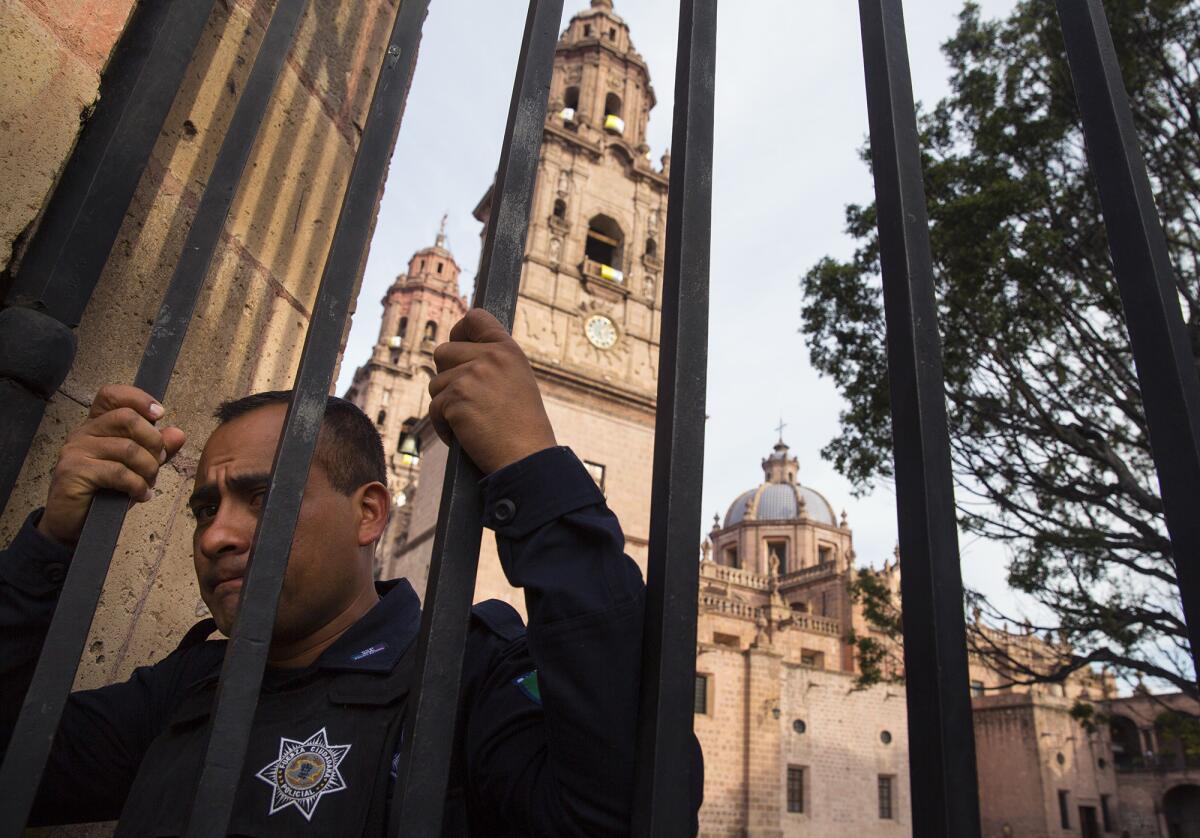
After urging Mexico’s political and religious leaders to take stronger stands against organized crime, Pope Francis takes his message Tuesday to a front line of the drug war, the western state of Michoacan, where many hope he will keep up the pressure.
The pope’s strong words during a speech Saturday have been widely embraced here in a region that has reached states of near-anarchy from years of drug cartel domination and government corruption.
Francis will preside over a Mass at a stadium in Morelia in the morning and meet with young people in the afternoon.
The pope’s visit will also take him to the cathedral that sits in Morelia’s historic central plaza, where a grenade attack in 2008 killed eight people and came to symbolize the deadly reach of organized crime into everyday life.
Local media have reported that Francis will meet with victims of drug violence, which would be the first time on his trip that he has done so. Demands from victims’ groups to meet with the pope have increased in recent days.
- Share via
Holding their places
- Share via
A song and a little price gouging
- Share via
Video snapshot: Waiting for the pope
- Share via
Pope says he prefers a ‘wounded family’ to a society ‘sick from isolationism’
After visiting the cathedral in San Cristobal, Pope Francis flew via helicopter to the Chiapas state capital, Tuxtla Gutierrez, to hear testimonies from families about the hardships they face.
Among those who spoke at a stadium were a teenager in a wheelchair and a single mother.
The pontiff acknowledged that living in a family is not always easy and “can often be painful and stressful.”
But he said, “I prefer a wounded family that makes daily efforts to put love into play, to a society that is sick from isolationism and habitually afraid of love.”
It was his last public event of the day.
- Share via
The celebrations have already started in Michoacan
- Share via
A gift for the pope: two bibles translated into Mayan languages
The Mass at the sports stadium was a massive spectacle, featuring indigenous and other musical groups from across Mexico, as well as regional dances. The bishop of Chiapas, Felipe Arizmendi, joined in the dancing.
The pope wore a cassock with embroidery from the town of Zinacantan, where artisans are known for their sewing skills. Indigenous work was also incorporated into the pope’s mitre, or head dress, and his staff, church authorities said
At the end of the service, local priests gave the pope a pair of bibles translated into Tzotzil and Tzeltal, Mayan languages still widely spoken in Chiapas.
The bibles took 25 years to translate, according to church authorities. The Mass also included readings in Chol, another Mayan language.
- Share via
Crowds cheer: ‘Long live the pope of the poor!’
After presiding over a multilingual Mass, Pope Francis left the San Cristobal de las Casas sports stadium in the popemobile to thunderous cheers.
“Viva el papa de los pobres!” -- “Long live the pope of the poor!” -- was one of the many chants, along with: “Que viva el papa de la libertad!” -- “Long live the pope of Liberty!”
- Share via
Families divided by U.S.-Mexico border meet at the fence
More than 300 people -- most from families living on both sides of the U.S.-Mexico border -- gathered Monday at the chain-link fence separating the two nations to call for reforming U.S. immigration laws. About 50 people stood on the Mexican side of the border, while a larger crowd gathered on the El Paso, Texas, side. The event, timed to coincide with the pope’s visit to Mexico, was organized by immigrant rights activists to illustrate how the border and immigration policy divide families.
- Share via
Environmental challenge ‘demands our response,’ pope says
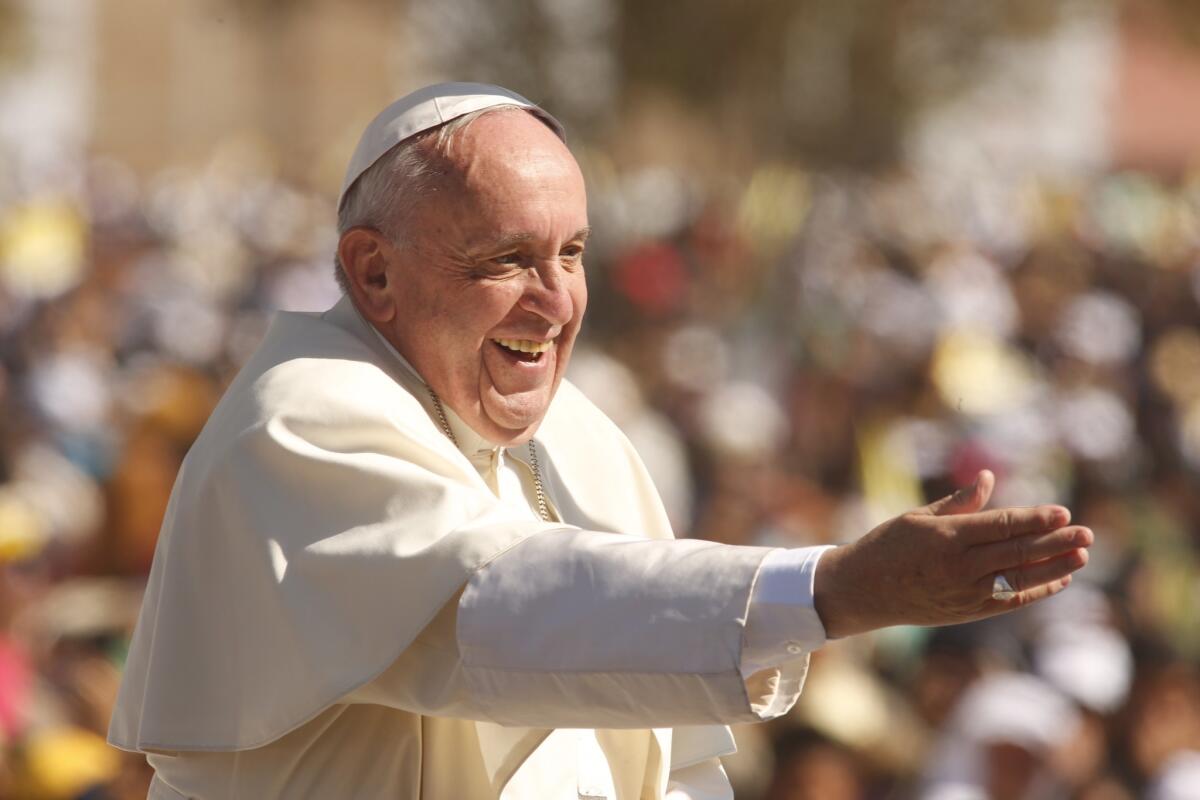
In his homily in Chiapas state, Pope Francis spoke of his concern about protecting the planet, which he described as among the “most abandoned and maltreated of our poor.”
The environmental challenge that we are experiencing and its human causes affects us all and demands our response. We can no longer remain silent before one of the greatest environmental crises in world history
— Pope Francis
“In this regard, you have much to teach us,” the pontiff added, speaking to a stadium packed with members of Mexico’s long marginalized native communities.
“Your peoples, as the bishops of Latin America have recognized, know how to interact harmoniously with nature, which they respect as a ‘source of food, a common home and an altar of human sharing.’”
- Share via
Pontiff’s homily stresses plight of Mexico’s indigenous people
After arriving via helicopter, Pope Francis made a round in the popemobile through the legions assembled at the sports stadium in San Cristobal de las Casas where a solemn Mass is being celebrated.
The pontiff’s homily stresses the plight of the diverse indigenous community, long marginalized in Mexican society.
“On many occasions, in a systematic and organized way, your people have been misunderstood and excluded from society,” Francis said.
Readings were done in several indigenous languages, including the Mayan tongues of Tzotzil and Tzeltal, both still widely spoken in rural Chiapas.
The pope spoke a few words in Tzotzil: “The law of the Lord is perfect, and his word revives the soul.”
Musicians gathered on a patch of grass for a post-service performance by local bands.
- Share via
A papal kiss for a baby in San Cristobal de las Casas

Pope Francis pauses to kiss a baby while riding through a crowd of pilgrims, many from outlying indigenous villages, at the Municipal Sports Center in San Cristobal de las Casas in Mexico’s southern Chiapas state. The pontiff is celebrating a Mass on Monday that will include several Mayan languages.
- Share via
Poverty of indigenous communities not so evident in San Cristobal
The poverty of Chiapas’ indigenous people is not clearly evident in San Cristobal de las Casas, which has been transformed in two decades from an off-the-beaten-track stop favored by backpackers and roving bohemians to a mainstream tourist destination bristling with Wi-Fi cafes, upscale chocolate emporia and a jazz bar or two.
The indigenous masses mostly live in isolated towns and villages in the mountains and semitropical lowlands, places where few visitors venture—and areas that won’t be on the pope’s agenda. They come to San Cristobal to sell their goods and buy supplies, often donning colorful traditional dress, providing a stark contrast to others frequenting the wine bars and designer clothing outlets.
However, in recent days thousands of indigenous people from Chiapas and neighboring Guatemala have been streaming into San Cristobal, with plans to catch the papal Mass that will feature several Mayan languages.
Local churches and seminaries were opening up their doors to the pilgrims in advance of the service, which is to be held at a sports stadium.
- Share via
58% of Chiapas’ population professes to be Catholic
Indigenous people in Chiapas have been abandoning the Roman Catholic Church in large numbers for evangelical congregations, a trend that the Vatican is keen to reverse.
Fewer than 6 in 10 Chiapas residents profess to be Catholics, compared with almost 9 in 10 Mexicans nationwide.
- Share via
A miles-long line to see the pope in Chiapas
As a foggy dawn broke Monday over San Cristobal de las Casas, the streets were already thronged with tens of thousands of people awaiting entry into the cathedral and the municipal stadium, two venues where the pope is scheduled to appear.
Streets were blocked and traffic was strictly limited.
The line outside the stadium stretched for several miles, winding through streets where vendors sold atole de arroz, a hot rice drink, along with coffee, hot chocolate, tamales and tortas. And of course there were the now-familiar entrepreneurs hawking pope calendars, flags, T-shirts and other pope-themed paraphernalia.
Many came from outlying, mostly indigenous towns and were decked out in their finest traditional dress—the sheepskin outfits of San Juan Chamula; the colorful, hand-sewn blouses and vests of Zinacantan; the straw hats outfitted with colorful ribbons worn by the men of Tenejapa,
Outside the cathedral, Veronica Lopez Perez, 62, waited with a green, hand-crafted wooden cross that she hoped the pope would bless. She, her brother and her mother all came from San Juan Chamula, a mostly indigenous town outside San Cristobal.
“We heard he is a good man—he cares for the poor,” said her brother, Ricardo Lopez Perez, 39, who wore a broad-brimmed straw hat, a white sheepskin vest and polished cowboy coots. “We never thought the pope would come to see us here.”
Many of those arriving for the afternoon event in the cathedral were in wheelchairs and on crutches.
“This is like a dream for me,” said Maria Magdalena Munoz Robledo, 49, from the city of Comitan de las Flores.
She wore a double rebozo, or shawl, one yellow and one white—the colors of the Vatican—along with a straw hat, protection from the sun that would break through later in the morning.
“Francisco is a man of the people, like St. Francis of Assisi,” she said, naming the Catholic saint. “We have to wait, but who cares? It’s worth it.”
- Share via
In Chiapas, some hope pope’s visit will focus attention on plight of indigenous peoples
Even in Mexico’s southern Chiapas state, where Spanish is often a second language, indigenous communities can feel stuck on the peripheries of society.
Their plight is expected to be the central theme of Pope Francis’ visit here in San Cristobal de las Casas Monday, the latest stop on a six-day swing through Mexico that has highlighted the pontiff’s emphasis on the fate of society’s less fortunate.
Some voice hope that the pope’s presence will re-focus the Mexican leadership’s attention on the hardships of its indigenous minority, 22 years after the “Zapatista” revolution brought the issues to the forefront.
Ultimately, however, the Zapatistas failed to win wide-ranging support, and these days the results of their movement appear mixed at best.
“In Chiapas there is a situation of extreme poverty, of marginalization of the indigenous community, of social conflicts,” said Pedro Arriaga, spokesman for the Roman Catholic diocese of San Cristobal.
“Of course we know that one visit by the pope won’t resolve all that. … But we do hope for a profound spiritual experience with the people that will help us transform our social conscience.”
- Share via
Some in Chiapas resent pope’s focus on native people
Mexico’s southern Chiapas state is home to a large mestizo, or mixed-race, community, which tends to dominate the mercantile class of San Cristobal de las Casas.
Some people resent the pope’s focus on indigenous people during his visit here so far, arguing that the struggles of mestizo people are just as profound.
“I know a lot of people who said if the pope is going to have an indigenous Mass, then I’ll just stay home,” said one church volunteer, who was busily helping find housing for indigenous pilgrims Sunday but asked that his name not be used for privacy reasons.
- Share via
Pope Francis prays at tomb of controversial bishop
After lunch with indigenous community leaders, Pope Francis visited the cathedral that houses the tomb of the late bishop of San Cristobal de las Casas, Samuel Ruiz.
Ruiz’s pastoral work with the poor apparently impressed Francis, who has also emphasized the church’s role in helping the less fortunate.
During his lifetime, however, Ruiz often ran afoul of church authorities and local politicians, who accused him of practicing Marxist-oriented “liberation theology” and politicizing religion.
Many catechists and deacons trained under Ruiz reportedly joined the 1994 Zapatista rebellion, an armed uprising that sought to improve conditions for indigenous communities. Later, Ruiz was a key mediator in talks between the government and the Zapatista rebels.
As he entered the cathedral, Francis stopped for a moment to pray in front of the tomb of Ruiz, then said the “Hail Mary” prayer with about 1,200 guests.
— Patrick J. McDonnell— Cecilia Sanchez
- Share via
Some activists disappointed that pope didn’t specifically address femicide
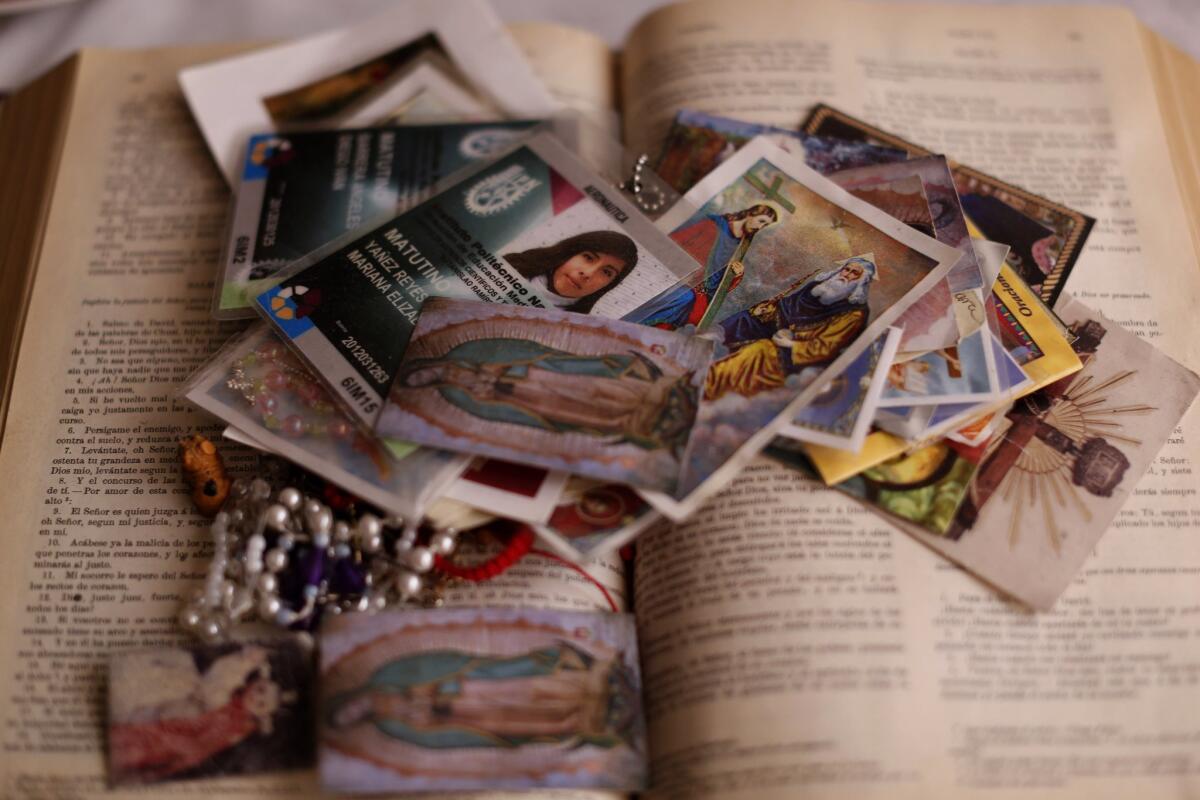
Some activists were disappointed that Pope Francis didn’t mention the high incidence of murdered and disappeared women in the state of Mexico when he celebrated Mass in one of the region’s most violent communities Sunday.
In July, Mexico’s Secretariat of the Interior declared an alert in the state, highlighting Ecatepec as one of the most dangerous places for women. More than 1,500 women have disappeared in the state since 2005, according to figures quoted by the Associated Press.
They include 18-year-old Mariana Yañez, who left home to make some photocopies in 2014 and never returned. Months later, her dismembered remains were found in a bag in a sewage canal not far from Ecatepec.
Since the pope arrived in Mexico late Friday, he has spoken repeatedly about the violence afflicting the country. But Maria de la Luz Estrada, coordinator of the National Citizens Observatory on Femicide, said she hasn’t heard a message of solidarity from Francis on the specific issue of murdered women.
“It was important that he made a call, not just to the conscience of the faithful, but to the authorities,” she told W Radio. “Because these actors grow, not just because of the discrimination, but because of the impunity, the corruption, when they don’t investigate, when they never put the responsible people in prison.”
— Laura TillmanRead More
- Share via
Pope plays doctor and gets a Valentine’s Day drawing
- Share via
Next up: A children’s hospital in Mexico City
From Ecatepec, the most poor of Mexican communities, Pope Francis is making his way to a children’s hospital in Mexico City where he will meet the country’s most rich.
Among them is expected to be communications tycoon Carlos Slim, one of the wealthiest people on the planet and a patron of the hospital.
Mexico has one of the greatest divides between rich and poor among Western countries. Roughly half the nation, or 60 million Mexicans, live in abject poverty
- 5:19 p.m.: It appears that Carlos Slim did not attend the event, although a son was on the guest list.
- Share via
Pope prays for a country where there is ‘no need to emigrate in order to dream’
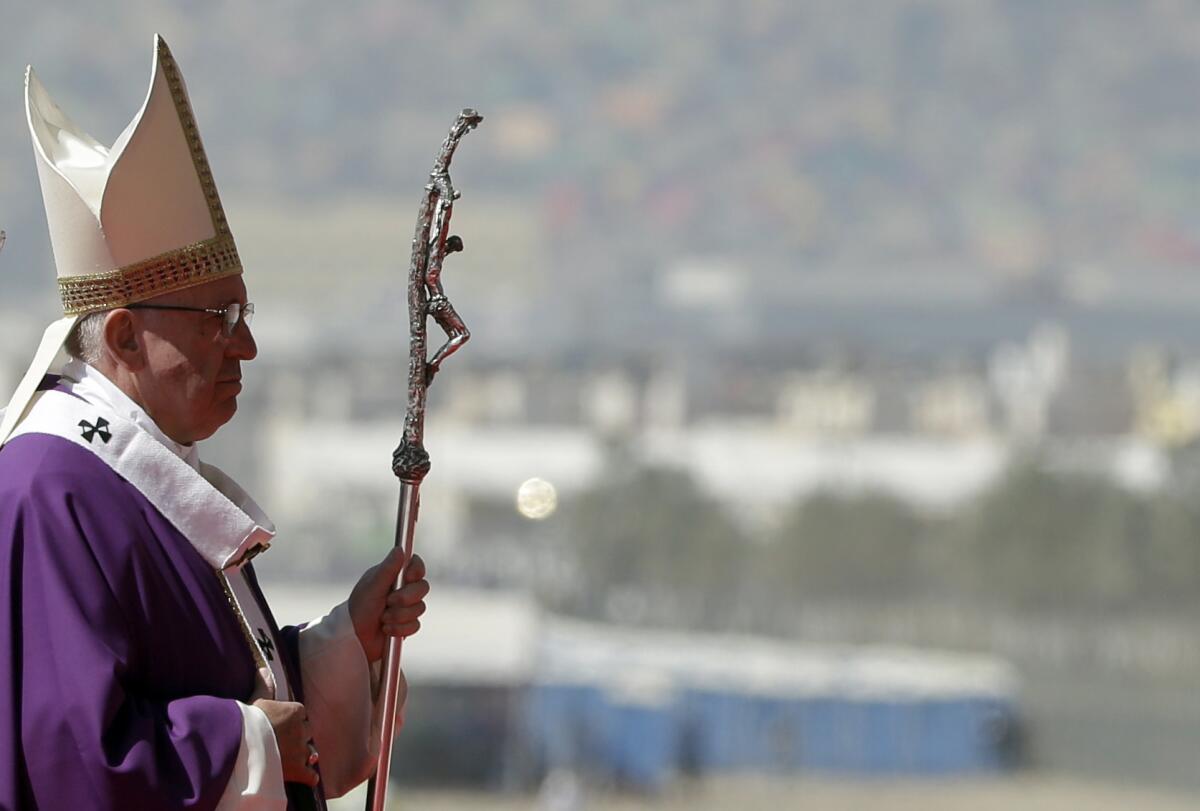
Pope Francis has not minced his words since arriving in Mexico, criticizing both the political elite and that of his own church for being seduced by the trappings of wealth and power to the detriment of the poor and marginalized.
As the Mass closed Sunday, the pope spoke out on behalf of the poor and children who are often trapped by drug-gang violence in Ecatepec and throughout the country.
The pope said he prayed for a country where there is “no need to emigrate in order to dream” and where “the opportunism of a few” is not built on the “poverty and desperation of many.”
“A land,” the pope said, “that does not have to cry for men, women, youth and children who end up destroyed at the hand of the traffickers of death.”
- Share via
Pope warns Mexicans against negotiating with the devil
Departing from his prepared remarks Sunday, Pope Francis warned Mexicans against negotiating with the devil.
Con el demonio no se dialoga, no se puede dialogar porque nos va a ganar siempre.
— El Papa Francisco
“With the devil, you do not dialogue,” the pontiff told the crowd assembled at a massive open-air Mass in Ecatepec, a community beset by drug-gang violence. “... He will always win.”
— Cecilia SanchezRead More
- Share via
A pope who cares about the young: ‘He sees that we’re the future’

Sporadic screams turned to a collective roar, as word trickled through the crowd that the popemobile was near. People staked out spots on ladders, roofs, their fathers’ shoulders.”Se ve, se siente. El Papa está presente!” they chanted. “You can see
Francisco Valdez, 24, traveled 12 hours from Monterrey and slept outside Saturday night, hoping to snag a good spot to catch a glimpse of Pope Francis in Ecatepec.
He claimed a space near the front of the crowd, waiting with his cellphone hoisted for the pope’s motorcade to drive by.
As the pontiff neared, a woman broke into sobs and Valdez hit the record button on his phone. With a whir, Pope Francis had passed.
“He went so fast!” Valdez shouted. “Still, wow.”
Valdez loves the pope and often watches videos of him speaking on YouTube. He especially liked the pontiff’s address to young people in Brazil in 2013.
“He cares about young people,” Valdez said. “He sees that we’re the future of the church.”
- Share via
Cotton candy, balloons: It’s a carnival in Ecatepec
Balloons, flags and even cotton candy. There’s a carnival-like atmosphere in Ecatepec for the pope’s visit.
- Share via
Excitement is building in San Cristóbal de las Casas
- Share via
An appeal for unity from Pope Francis
Lent is a time of conversion, of daily experiencing in our lives of how this dream is continually threatened by the father of lies, by the one who tries to separate us, making a divided and fractious family a divided and fractious society.
— Pope Francis
Cuaresma, tiempo de conversión porque a diario hacemos experiencia en nuestra vida de cómo ese sueño se vuelve continuamente amenazado por el padre de la mentira, por aquel que busca separarnos, generando una familia dividida y enfrentada una sociedad dividida y enfrentada.
— El Papa Francisco
- Share via
Pope Francis presides over huge open-air Mass
Pope Francis is presiding over a Mass for hundreds of thousands of people gathered in a vast field in Ecatepec, a gritty suburb on the edge of Mexico City.
The Mexican bishops’ conference said some 300,000 tickets had been handed out for the ceremony. Many more people lined the route taken by the pope’s motorcade.
- Share via
On the ground in Ecatepec
Pope Francis waves from the popemobile as he is whisked through Ecatepec — a crime-plagued suburb northeast of Mexico City — to celebrate an open-air Mass before hundreds of thousands of people.
- Share via
Confessions while we wait for the pope
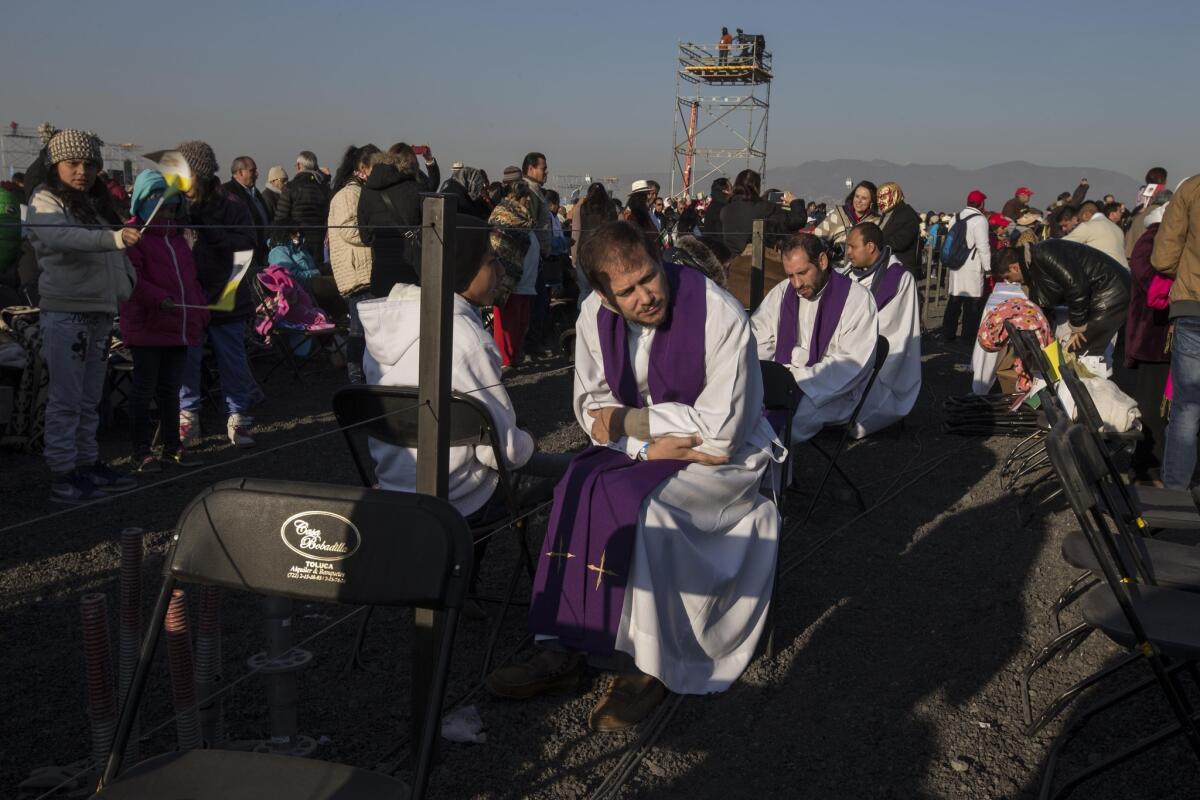
Priests were hearing confessions as the crowd waited for Pope Francis to arrive in Ecatepec, Mexico.
- Share via
Praise for the pope: ‘It’s time somebody shook them up’
In Mexico City, sparse but enthusiastic crowds lined the barricaded streets amid tight security to watch the pope’s motorcade drive by.
“We saw him yesterday and fell in love; now we’re here again,” said Amanda Ordunez, who traveled from Colombia with several friends to see Pope Francis.
At the Angel of Independence Monument, people responded positively to the pontiff’s strong words on Saturday when he urged the government and Roman Catholic Church to do more to fight corruption and drug traffickers.
“As an ecclesiastical authority, it was the best thing he could do,” said Luis Alfredo de la Cruz, 48, an engineer from the northern Mexican state of Coahuila, which has been hard hit by drug violence.
De la Cruz said such a public recognition of the country’s problems was sorely needed. “The only way to improve things is to recognize these issues. That’s why I think he spoke so strongly.”
Maria Rodriguez, visiting from San Diego with her granddaughter, said she hoped it served as a wake-up call for government and church leaders.
“It’s time somebody shook them up,” she said.
— Richard MarosiRead More
- Share via
Pope stops his motorcade to greet nuns
En route to the waiting helicopter, Pope Francis stopped his motorcade and stepped from his car to greet a bevy of nuns who were jostling for space in the crowd on the sidewalk.
The nuns chatted excitedly to the pope as he offered a few words of thanks for their work in the church and blessed them.
- Share via
Thousands camp out overnight to see the pope
Thousands of people camped out overnight in Ecatepec, Mexico, awaiting Pope Francis’s visit, huddled beneath blankets.
With temperatures in the mid-30s, people sipped cafe de olla and scarfed down chilaquiles to warm up. Thick smoke from a trash fire nearby chocked the air.
Near a screen that will project the pope’s homily, a band with tambourines sang a wake-up call to campers.
“Get up, get up!” they sang. “Praise our Savior.”
People hopped out of their sleeping bags and stretched.
“Here, here!” a woman shouted, flapping a yellow-and-white pope flag in the air. “Only 10 pesos” -- about 50 cents.
By 7 a.m., a group that arrived at sundown Saturday from a diocese near Toluca began to crawl out from under fleece blankets.
“It’s freezing!” Paola Garcia, 23, shouted. “I didn’t sleep at all, did you?”
Two of her friends shook their heads.
One of their group leaders, Julia Garcia Sanchez, chimed in with an attitude check.
“With an open heart and faith, you can’t even feel the cold,” she said. “The presence of God and comfort of Mary take away all pain.”
Nearby, a helicopter swooped down, hovering for a few moments above the crowd.
People started to dance and scream, until they realized it was a government chopper -- not the pope.
“Francisco!” a little boy screamed. “Please hurry!”
- Share via
Pope Francis heads to the heliport: destination Ecatepec
- Share via
Crowds are gathering for the pope in Ecatepec
- Share via
‘This place is terrifying’
Pope Francis has vowed to give voice to the downtrodden during his trip to Mexico, and many in Ecatepec, where the pontiff will visit Sunday, say he’s picked the perfect place.
“This place is terrifying,” said Guadalupe Reyes, whose 18-year-old daughter disappeared from Ecatepec in 2014. “If you’re talking about people on the margins, that’s us.”
One of the most crowded, impoverished and violent parts of the country, Ecatepec — a bedroom community of Mexico City — registers one of the highest rates of killings and disappearances of women in the country.
In July, Mexico’s Secretariat of the Interior declared an alert in the state of Mexico, specifically highlighting Ecatepec.
- Share via
Some have mixed feelings about the pope’s visit
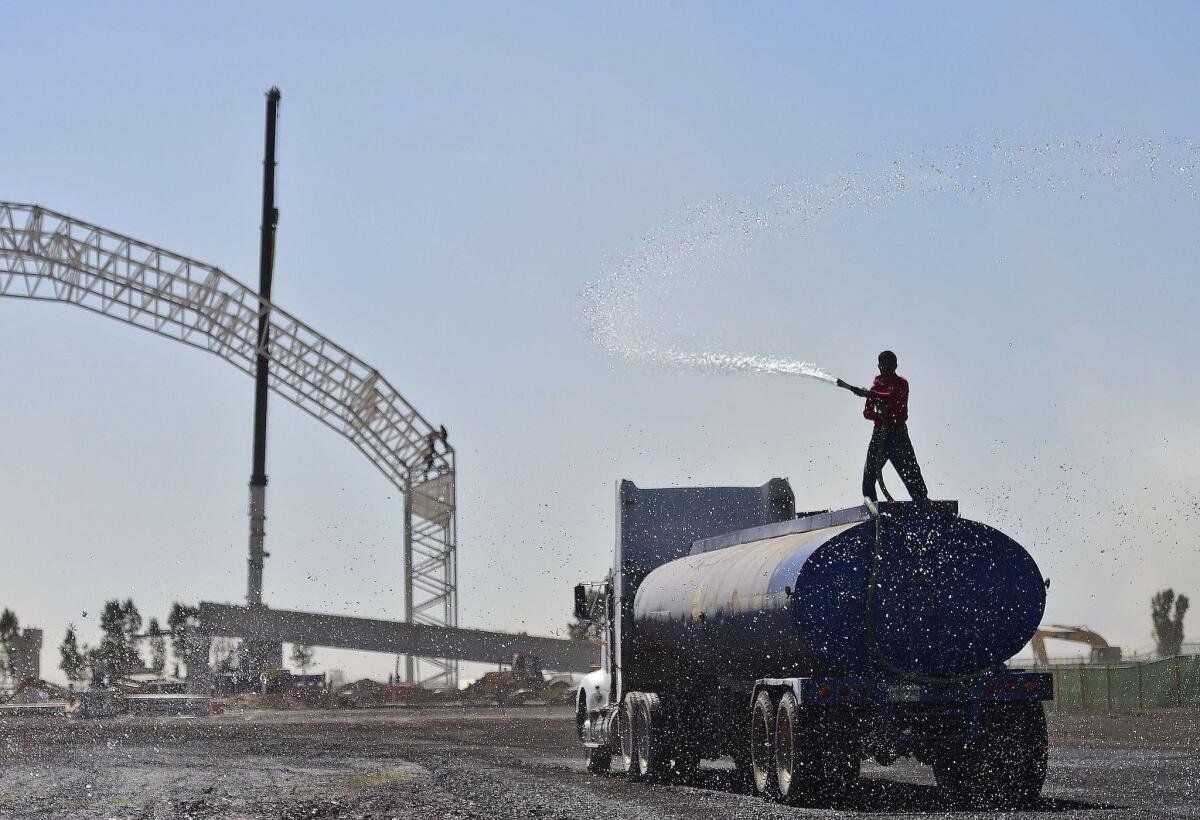
Dulce Padilla, 24, who works at a tarot card shop along the popemobile’s route in Ecatepec, has mixed feelings about the visit.
Trees trimmed, dividing lines painted onto the streets, weeds pulled — she knows the expenses must be adding up.
Gov. Eruviel Avila says the pope’s visit will cost the state of Mexico more than $520,000, including $140,000 for a high-tech vehicle christened the “Papa ambulancia.”
“There are so many people dying of hunger here, or freezing to death, and we’re throwing money at this?” Padilla said. “It’s great that the pope is coming, but he should see Ecatepec as it is: Ugly. Not dressed in a temporary costume.”
- Share via
A mural painted for the pope in Ecatepec
- Share via
Pope Francis gets his wish
Pope Francis was granted his wish for a moment alone with the iconic image of the Virgin of Guadalupe, which the pontiff said has long been a source of personal inspiration.
- Share via
Pope celebrates first Mass in Mexico
Pope Francis celebrated his first Mass in Mexico at the Basilica of Our Lady of Guadalupe, the most visited Marian shrine in the world.
Tens of thousands filled the square outside to welcome the pontiff.
Francis delivered a homily that focused on the story of the Virgin revealing herself to the peasant Juan Diego in 1531.
“Just as she made herself present to little Juan, so too she continues to reveal herself to all of us, especially to those who feel, like him `worthless,’” the pontiff said.
- Share via
Inside the Basilica of Our Lady of Guadalupe
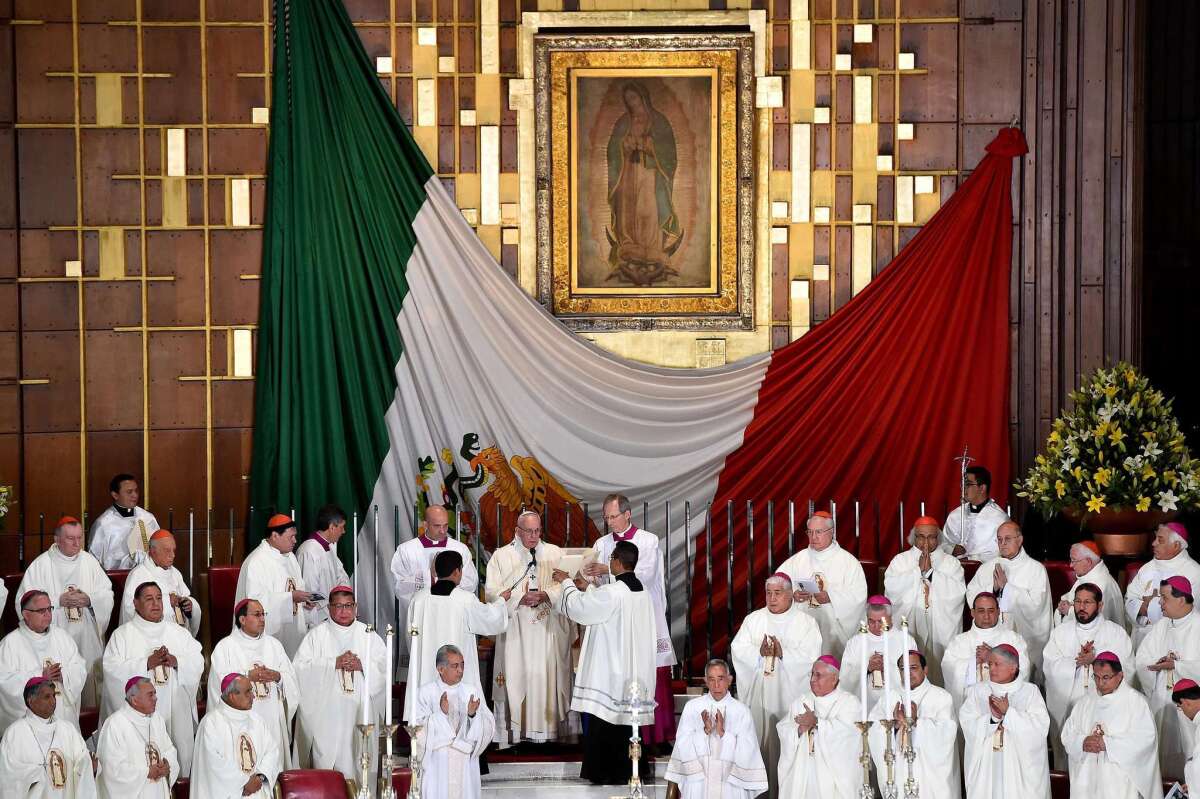
Pope Francis presides over a Mass in the Basilica of Our Lady of Guadalupe, considered the most important Marian shrine in the world.
- Share via
Mexicans reflect on a pope who ‘speaks our language’
The Gonzalez-Suarez family traveled three hours from the state of Queretaro to Mexico City and camped out in the Zocalo to see Pope Francis on Saturday.
“We spent a very cold night, but we don’t mind. Our dream is to see the pope,” said Enrique Gonzalez, a car dealer accompanied by his wife and two sons.
Marisela Rodriguez traveled to the Mexican capital from Laredo, Texas, with her sister, Guadalupe Gonzalez.
“What’s so important is that this pope can speak to us in our language,” she said. “He can speak directly to us, he knows our sentiments, he is one of us, a Hispano. That makes a big difference.”
Also among the crowds was Carlos Covarrubias, a taxi driver.
“This pope is incredible. He’s always smiling, he’s charismatic. He has already captured the Mexican people’s heart. We have adopted him as Mexican.”
Jorge Martinez, 28, a teacher, led a group of more than 50 high school students.
“This is a pope who is very humble, who cares for the poor and working people,” he said. “All of our students are very enthusiastic to come and see him.”
- Share via
Practicing the wave at the Basilica
- Share via
A personal request from the pope: A few minutes alone with the Virgin of Guadalupe
Before his journey to Mexico, Pope Francis had a special favor to ask: that he be granted a few minutes alone with perhaps the most revered religious artifact in the Western Hemisphere, a piece of fabric bearing the image of the Virgin of Guadalupe.
He should get the time this evening, when he celebrates Mass at the Basilica of Our Lady of Guadalupe.
It was a stunningly personal request from the pope. But Francis knows the Virgin well, he said, because she has seen him through difficult times.
“How many times I have been fearful of a problem or that something bad has happened and I don’t know how to react, and I pray to her,” he said in September.
As a man born in Argentina and the first pope from the New World, it should be no surprise that Francis turns for comfort to the “Empress of the Americas.”
In Mexico and Latin America, as well as the southwestern United States, this image of the Virgin Mary is everywhere — stenciled on buildings, sprayed onto the sides of trucks, inked into people’s arms and legs and even the sides of their necks.
The Virgin offers adherents her protection, listens to their sorrows and alleviates their pain. She cannot herself perform the miraculous, according to Catholic teaching, but she may intercede on behalf of those who ask her blessing.
- Share via
A special altar takes shape in Ciudad Juarez
- Share via
A scolding from the pope
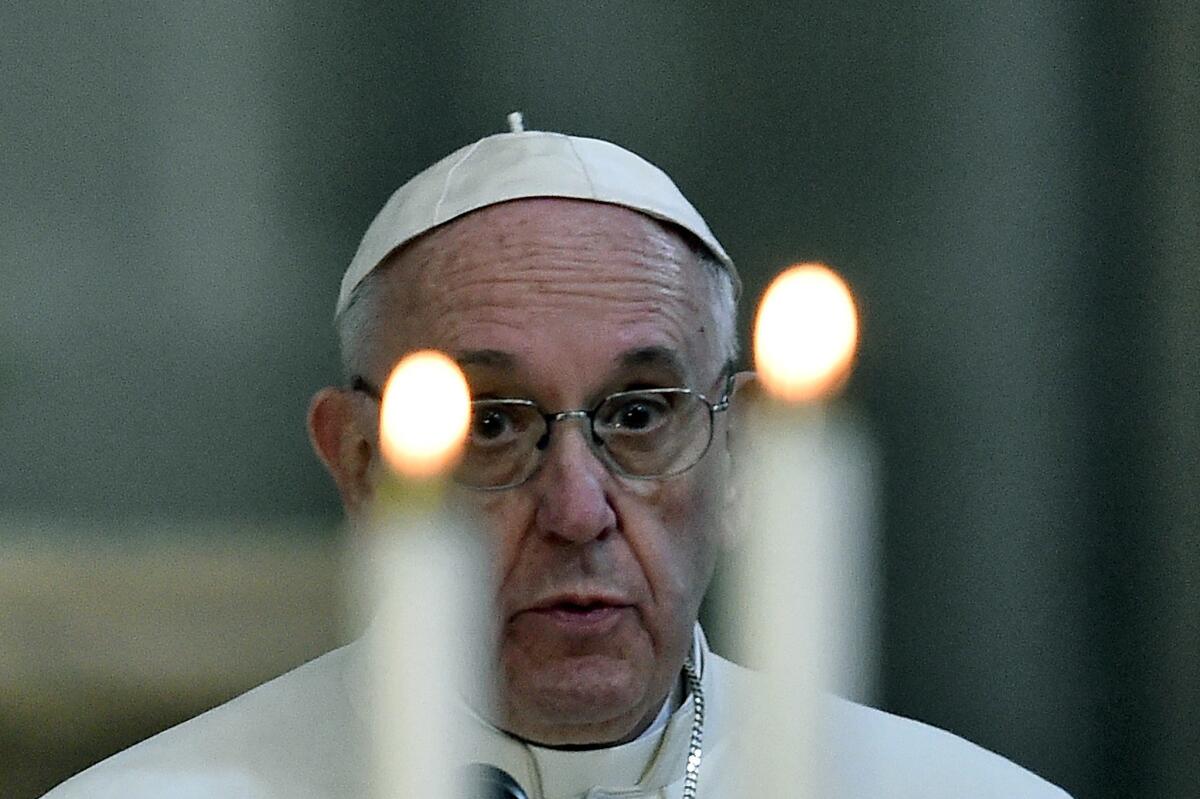
Vigilen para que sus miradas no se cubran de las penumbras de la niebla de la mundanidad; no se dejen corromper por el materialismo trivial ni por las ilusiones seductoras de los acuerdos debajo de la mesa; no pongan su confianza en los ‘carros y caballos’ de los faraones actuales, porque nuestra fuerza es la ‘columna de fuego’ que rompe dividiendo en dos las marejadas del mar, sin hacer grande rumor.
— El Papa Francisco
The pope departed from his prepared text to scold his bishops, telling them if they have disputes, to “fight like men ... men of God.”
It was a very public airing of what has been a largely private conflict within the Mexican church over how critical it should be of the government’s policies, among other issues.
The pope seemed to indicate that he was tired of backbiting and what he called gossip.
He also told the bishops to avoid “seductive illusions” of cavorting with the elite and instead work for the poor and marginalized -- something that much of the Mexican hierarchy has notoriously ignored. And he urged them to do more for the country’s indigenous peoples.